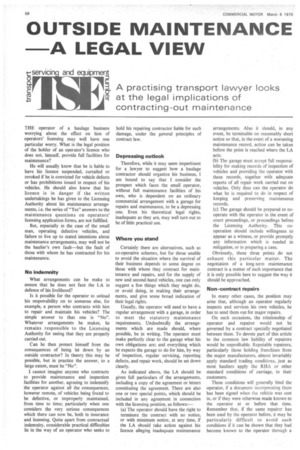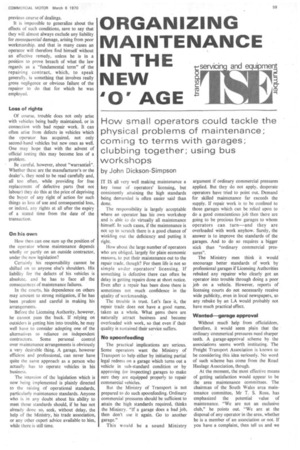OUTSIDE MAINTENANCE A LEGAL VIEW
Page 60

Page 61

If you've noticed an error in this article please click here to report it so we can fix it.
3 A practising transport lawyer looks 0
at the legal implications of contracting-out maintenance
THE operator of a haulage business worrying about the effect on him of operators' licensing may well have one particular worry. What is the legal position of the holder of an operator's licence who does not, himself, provide full facilities for maintenance?
He will usually know that he is liable to have his licence suspended, curtailed or revoked if he is convicted for vehicle defects or has prohibitions issued in respect of his vehicles. He should also know that his licence is in danger if the written undertakings he has given to the Licensing Authority about his maintenance arrangements, i.e. the series of "Yes" answers to the maintenance questions on operators! licensing application forms, are not fulfilled.
But, especially in the case of the small man, operating defective vehicles, and failure to live up to stated intentions about maintenance arrangements, may well not be the haulier's own fault—but the fault of those with whom he has contracted for his maintenance. • No indemnity What arrangements can he make to ensure that he does not face the LA in defence of his livelihood?
Is it possible for the operator to unload his responsibility on to someone else, for example, a person who contracts with him to repair and maintain his vehicles? The simple answer to that one is "No". Whatever arrangements he makes, he remains responsible to the Licensing Authority for seeing that they are properly carried out.
Can he then protect himself from the consequences of being let down by an outside contractor? In theory this may be possible, but in practice the answer, to a large extent, must be "No".
I cannot imagine anyone who contracts to provide maintenance and inspection facilities for another, agreeing to indemnify the operator against all the consequences, however remote, of vehicles being found to be defective, or improperly maintained, from time to time; particularly when one considers the very serious consequences which there can now be, both in insurance and licensing. Quite apart from contractual indemnity, considerable practical difficulties lie in the way of an operator who seeks to hold his repairing contractor liable for such damage, under the general principles of contract law.
Depressing outlook Therefore, while it may seem impertinent for a lawyer to suggest how a haulage contractor should organize his business, I am bound to say that I consider the prospect which faces the small operator, without full maintenance facilities of his own, who is dependent on an ordinary commercial arrangement with a garage for repairs and maintenance, to be a depressing one. Even his theoretical legal rights, inadequate as they are, may well turn out to be of little practical use.
Where you stand Certainly there are alternatives, such as co-operative schemes, but for those unable to avoid the situation where the survival of their business depends to some degree on those with whom they contract for maintenance and repairs, and for the supply of new and second-hand vehicles, one can only suggest a few things which they might do, or avoid doing, in making their arrangements, and give some broad indication of their legal rights.
Usually, the operator will need to have a regular arrangement with a garage, in order to meet the statutory' maintenance requirements. Undoubtedly the arrangements which are made should, where possible, be in writing. The operator must make perfectly clear to the garage what his own obligations are; and everything which he expects the garage to do for him, by way of inspection, regular servicing, reporting defects, and repair work, should be set down clearly.
As indicated above, the LA should be given full particulars of the arrangements, including a copy of the agreement or letters constituting the agreement. There are also one or two special points, which should be included in any agreement in connection with the licensing position, as follows:— (a) The operator should have the right to terminate the contract with no notice, or with minimum notice, at any time, if the LA should take action against his licence alleging inadequate maintenance arrangements. Also it should, in any event, be terminable on reasonably short notice so that, in the event of a worsening maintenance record, action can be taken before the point is reached where the LA acts.
(b) The garage must accept full responsibility for making records of inspection of vehicles and providing the operator with these records, together with adequate reports of all repair work carried out on vehicles. Only thus can the operator do what he is required to do in respect of keeping and preserving maintenance records.
(c) The garage should be prepared to cooperate with the operator in the event of court proceedings, or proceedings before the Licensing Authority. This cooperation should include willingness to appear as a witness, or provide promptly any information which is needed in mitigation, or in preparing a case.
Obviously, these three points do not exhaust this particular matter. The
negotiation of a long-term maintenance contract is a matter of such importance that it is only possible here to suggest the way it should be approached.
Non-contract repairs In many other cases, the position may arise that, although an operator regularly inspects and services his own vehicles, he has to send them out for major repairs.
On such occasions, the relationship of operator and repairer would not be governed by a contract specially negotiated between them. To devote part of this article to the common law liability of repairers would be unprofitable. Reputable repairers, particularly those holding franchises from the major manufacturers, almost invariably apply standard trading conditions, just as most hauliers 'apply the RHA or other standard conditions of carriage, to their customers.
These conditions will generally bind the operator, if a document incorporating them has been signed when the vehicle was sent in, or if they were otherwise made known to the operator at or before that time. Remember that, if the same repairer has been used by the operator before, it may be particularly difficult to avoid such conditions if it can be shown that they had become known to the operator through a previous course of dealings.
It is impossible to generalize about the effects of such conditions, save to say that they will almost always exclude any liability for consequential damage, arising from poor workmanship, and that in many cases an operator will therefore find himself without an effective remedy, unless he is in a position to prove breach of what the law regards as a "fundamental term" of the repairing contract, which, to speak generally, is something that involves really gross negligence or obvious failure of the repairer to do that for which he was employed.
Loss of rights
Of course, trouble does not only arise with vehicles being badly maintained, or in connection with bad repair work. It can often arise from defects in vehicles Which the operator has acquired, not only second-hand vehicles but new ones as well. One may hope that with the advent of official testing this may become less of a problem.
Be careful, however, about "warrantie". Whether these are the manufacturer's or the dealer's, they need to be read carefully and, all too often, while providing for free replacement of defective parts (but not labour) they do this at the price of depriving the buyer of any right of action for such things as loss of use and consequential loss, or indeed, any rights at all after the expiry of a stated time from the date of the transaction.
On his own How then can one sum up the position of the operator whose maintenance depends wholly or partly on an outside contractor, under the new legislation?
Certainly his responsibility cannot be shifted on to anyone else's shoulders. His liability for the defects of his vehicles is absolute. and he has to face all the consequences of maintenance failures.
In the courts, his dependence on others may amount to strong mitigation, if he has been prudent and careful in making his arrangements.
Before the Licensing Authority, however, he cannot pass the buck. If relying on outsiders is getting him into trouble, he may well have to consider adopting one of the alternatives to reliance on independent contractors. Some personal control over maintenance arrangements is obviously a very desirable thing. A garage, however efficient and professional, can never have quite the same approach as a person who actually has to operate vehicles in his business.
The intention of the legislation which is now being implemented is plainly directed to the raising of operational standards, particularly maintenance standards. Anyone who is in any doubt about his ability to meet those standards should, if he has not already done so, seek, without delay, the help of the Ministry, his trade association, or any other expert advice available to him, while there is still time.




























































































































































